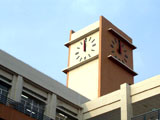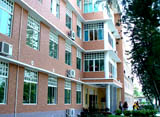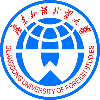Guangdong University of Foreign Studies
The University was set up in June 1995 when the then Guangzhou Institute of Foreign Languages and Guangzhou Institute of Foreign Trade were merged. The former was established in 1965 and was at the time one of the three institutes of foreign language study under the direct administration of the Ministry of Education. The latter was founded in 1980 at the time being one of only four institutions of its kind directly under the administration of the Ministry of Foreign Trade and Economic Cooperation. Graduates from this university are expected to use their ideological attainment and expertise to allow them to compete internationally. The university's graduates will on one hand be advanced specialists in their field, and on the other have highly developed general qualities, efficient and confident in using the foreign language they have learned and skillful in applying information technology. As what students learn at Guangdong University of Foreign Studies is in high demand, graduates from this university enjoy a higher employment rate than graduates from most other universities.
Currently the University offers 29 BA degree courses in 12 faculties and five departments, these falling into five broad disciplines, namely literature, economics, management, law and engineering. The University has been actively pioneering flexibility in degree course development in order to meet the needs of rapid social and economic changes. Of all the degree courses offered to students, three are categorized as key specialties at the provincial level, and one at national level. In addition, the university has two state-designated research centers, one for research in humanities and social sciences, and the other for training students of languages other than Chinese and English. Chinese Department classes are divided into five levels from A to E, with A being the first class for elementary students. New students are assigned a class by way of an entrance examination. A range of courses are available, starting from short-term programs in the summer and winter lasting four weeks or eight weeks. Students wishing to enroll for a longer period of study can join the semester-long programs, or register for a full year of Chinese studies. In addition to the compulsory morning classes covering the main aspects of Chinese language study (speaking, listening, reading and writing), students can fill their afternoons by signing up for a range of stimulating electives. The university has strong links with over 40 universities, academic institutions and cultural organizations in other countries and regions, with international students coming from the likes of the United States of America, the United Kingdom, France, Germany, Spain, Italy, Canada, Australia, Japan, Russia, Malaysia, Indonesia, Thailand, Vietnam, the Republic of Korea, Hong Kong, Macau, and many other nations and regions.
Guangdong University of Foreign Studies has a 1,300-strong staff, including over 250 professors and 330 lecturers. In addition, more than 40 experts and lecturers from other countries are employed. Specialist teachers of Chinese number approximately 50 to 60. Guangdong University of Foreign Studies is distinguished by its well-qualified and highly trained teachers, with students benefiting by learning from experts with years of experience teaching Chinese as a foreign language to international students.
Library GDUFS Library was set up in June 1995 with the merging of the then existing Guangzhou Institute of Foreign Languages Library and the Guangzhou Institute of Foreign Trade Library. The total floor space of the library is 22,000 square meters on the north campus and 28,000 square meters on the south campus. The library has open-shelf stack rooms with an area of 16,000 square meters for lending and reading and a multi-purpose auditorium equipped with 450 seats, projection and audio systems. The Library has a collection of 1.23 million volumes, with 820,000 books in Chinese, 240,000 in English, 130,000 in other foreign languages and 12,000 items of other types of material in 12 different languages. There are 55 English periodicals, 44 Chinese periodicals and more than 500 electronic books either in Chinese or English. In recent years, the library has been developing its electronic information resources, in particular its overseas network database. The library provides high-level information services based on the network such as conveyance of original literatures, on-line consultation, and on-line audio-visual services. Readers can enjoy a number of services besides borrowing and reading books and journals. For example, library users can search for information on the library network database, copy materials and ask for the original literature service. In addition, readers can also receive training and other media services. The library has 4,648 seats in its reading room, and 540 seats in the computer room. The 240-seat study room in the basement is open 24 hours a day. The library is currently striving to create an academic information service system featuring flexible services and advanced management and application of information technology. The library is open from 8 am ¨C 10 pm at night, and during vacations from 8 am ¨C 5 pm. Students of Chinese may use the library if they study for a period of two or more months, but as yet may not borrow books. Recreation Facilities Outside the dormitories, there is a decent-sized swimming pool, inexpensive tennis courts, volleyball courts, a football pitch, and a gym costing very little to use. The campus also has a bar and karaoke for evening entertainment. Every month, international students in the Chinese Department can take part social activities such as outings to famous sights in and around Guangzhou. Laundry Near the campus there are many dry cleaning and other service facilities. Money & Banking The nearest branch of the Bank of China is just at the gates of the campus, and there are many other banks nearby offering international money transfer, currency exchange and other services for international students. Medical Care The campus hospital is the first port of call for common medical complaints. Other nearby hospitals include Zhongshan Medical University's own hospital and Southern Medical University's own hospital. Food & Groceries Although the campus doesn't have any western restaurants, within five minutes walk you can reach North Street where there are many restaurants to suit all tastes, plus supermarkets and other shopping facilities. Postal Services A post office is available at the south entrance to the university. Students can send and receive mail and parcels from all around the world at the post office, which also offers envelopes, stamp and post boxes.
International student accommodation has a three star hotel rating. Students live in two-bed rooms, and all rooms are equipped with hot water, air conditioning, TVs, fridges, ADSL, and free laundry and cleaning services every two weeks.
Distance from airport and train station: The university is about a half an hour journey by taxi from either the airport or the train station. |

 Guangdong University of Foreign Studies (GDUFS) is one of China's
prestigious universities of international studies and one of Guangdong
Province's key institutions of higher learning. Covering an area
of 1.44 square kilometers, the university is situated in the northern
suburbs of Guangzhou, a city with a long history and rich cultural
legacy, as well as one of southern China's economic hubs. The
main campus lies to the north of the Baiyun Hills, with the other
campus a short distance away. With an elegant environment featuring
green trees, fresh air, and a limpid creek with small bridges
across it, the University is an ideal place to study.
Guangdong University of Foreign Studies (GDUFS) is one of China's
prestigious universities of international studies and one of Guangdong
Province's key institutions of higher learning. Covering an area
of 1.44 square kilometers, the university is situated in the northern
suburbs of Guangzhou, a city with a long history and rich cultural
legacy, as well as one of southern China's economic hubs. The
main campus lies to the north of the Baiyun Hills, with the other
campus a short distance away. With an elegant environment featuring
green trees, fresh air, and a limpid creek with small bridges
across it, the University is an ideal place to study. GDUFS places great importance on international cooperation,
and actively conducts academic and cultural exchanges with a
number of overseas institutions. The university has established
links with over 40 universities, academic institutions and cultural
organizations in other countries and regions, including the United
States of America, the United Kingdom, France, Germany, Spain,
Italy, Canada, Australia, Japan, Russia, Malaysia, Indonesia,
Thailand, Vietnam, the Republic of Korea, Hong Kong and Macau.
Currently, the total student population is 20,000. Among these,
about 9,400 are undergraduates and postgraduates, the other 11,000
being self-taught learners receiving training here before taking
exams and foreign students learning Chinese.
GDUFS places great importance on international cooperation,
and actively conducts academic and cultural exchanges with a
number of overseas institutions. The university has established
links with over 40 universities, academic institutions and cultural
organizations in other countries and regions, including the United
States of America, the United Kingdom, France, Germany, Spain,
Italy, Canada, Australia, Japan, Russia, Malaysia, Indonesia,
Thailand, Vietnam, the Republic of Korea, Hong Kong and Macau.
Currently, the total student population is 20,000. Among these,
about 9,400 are undergraduates and postgraduates, the other 11,000
being self-taught learners receiving training here before taking
exams and foreign students learning Chinese.